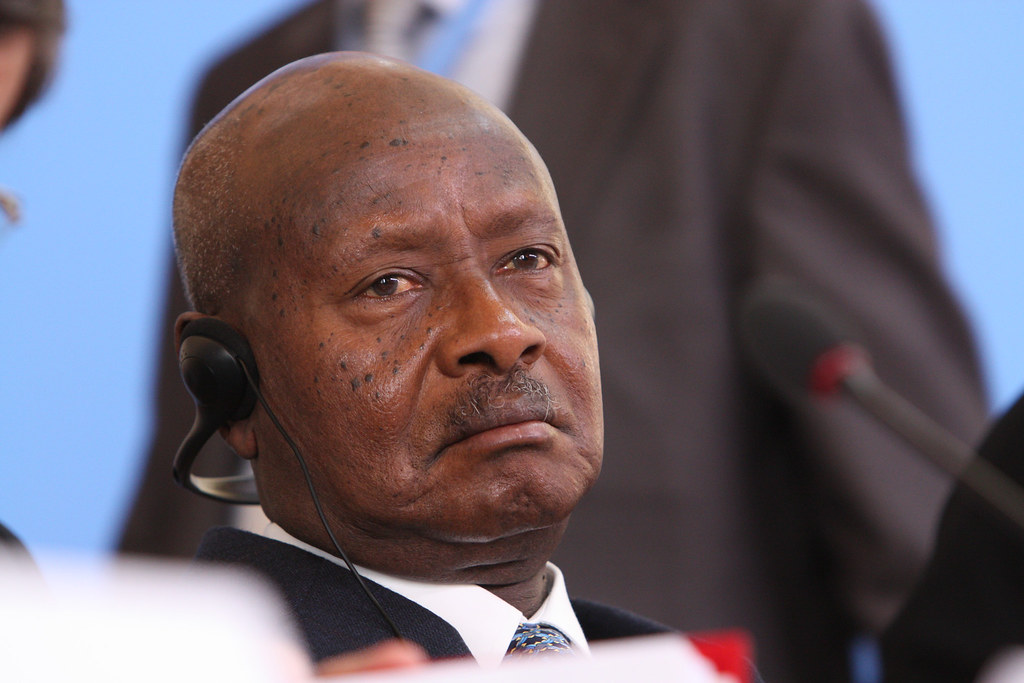Uganda president reportedly seeks an even tougher anti-LGBT law
Colin Stewart is a 45-year journalism veteran living in Southern…
Museveni sends Anti-Homosexuality Bill back to Parliament

President Yoweri Museveni of Uganda balked at immediately signing the harsh, repressive Anti-Homosexuality Bill that Parliament sent him last month. Instead, he sent the bill back to Parliament for amendments — perhaps seeking an even tougher bill.
What the amendments will be remained to be seen. Museveni reportedly is scheduled to meet Tuesday with leaders of parliament to craft the revisions.
According to Denis Hamson Obua, the parliament’s chief whip of Museveni’s ruling party, the changes will toughen the bill through amendments to “facilitate the reinforcement and the strengthening of some provisions in line with our best practices.”
The first reports on today’s events gave differing descriptions of Museveni’s action. He “refused to sign” the bill, according to the Associated Press. According to Reuters, relying on Denis Hamson Obua’s account, Museveni supports the bill, but returned it to Parliament to make it tougher. The Ugandan Monitor, citing Reuters, said that Museveni “agreed with MPs to sign the Bill into law after some improvements to facilitate its strengthening.”

The Associated Press news service reported:
KAMPALA, Uganda — President Yoweri Museveni of Uganda has refused to sign into law a controversial new bill against homosexuality that prescribes the death penalty in some cases, requesting that it should be amended.
Museveni’s decision was announced late Thursday after a meeting of lawmakers in his ruling party, almost all of whom support the bill approved by lawmakers last month.
The meeting resolved to return the bill to the national assembly “with proposals for its improvement,” a statement said.
It was not immediately clear what the president’s recommendations were. Homosexuality is already illegal in the East African country under a colonial-era law criminalizing sex acts “against the order of nature.” The punishment for that offense is life imprisonment.
Museveni is under pressure from the international community to veto the bill, which needs his signature to become law. The U.S. has warned of economic consequences if the legislation is enacted. A group of U.N. experts has described the bill, if enacted, as “an egregious violation of human rights.”
But the bill has wide support in Uganda, including among church leaders. It was introduced by an opposition lawmaker who said his goal was to punish the “promotion, recruitment and funding” of LGBTQ activities in the country. Only two of 389 legislators present for the voting session opposed the bill. …
KAMPALA, April 20 – Ugandan President Yoweri Museveni supports a bill containing some of the world’s harshest anti-LGBTQ legislation but sent it back to parliament on Thursday to make it even tougher, the ruling party’s chief whip said.
A group of lawmakers from Museveni’s ruling National Resistance Movement discussed the bill with the president and agreed in principle to sign the bill into law, chief whip Denis Hamson Obua said.
“Before that is done we also agree that the bill will be returned in order to facilitate the reinforcement and the strengthening of some provisions in line with our best practices,” he told a news conference after the meeting.
Obua said Museveni would hold a meeting on Tuesday with parliament’s legal and parliamentary affairs committee to draft the amendments.
Human rights activists and the U.S. government say the bill is among the harshest pieces of legislation penalising sexual minorities anywhere in the world.
The United Nations, European Union and a long list of corporate giants have condemned it.
It would impose the death penalty for so-called aggravated homosexuality, which includes having gay sex when HIV-positive, and 20-year sentences for “promoting” homosexuality.
Its passage last month with near unanimous support in parliament has already triggered a wave of arrests, evictions and mob attacks against LGBTQ Ugandans, members of the community say.
Museveni is a strong opponent of LGBTQ rights who last month called gay people “deviations from normal”.
He signed a law in 2014 that strengthened penalties for same-sex relations but has also suggested at times that homosexuality should be addressed through treatment rather than legislation.
He faced a possible juggling act trying to keep lawmakers happy over legislation that has broad popular support while not antagonising foreign donors who provide billions of dollars in aid each year.
Western governments suspended aid, imposed visa restrictions and curtailed security cooperation in response to the law Museveni signed in 2014.
That law was nullified within months by a domestic court on procedural grounds.
Same-sex relations are already illegal in Uganda, as they are in more than 30 African countries, but proponents of the new bill said stronger legislation was needed to combat the threat homosexuality presents to traditional family values.
Lawmakers in neighbouring Kenya and Tanzania have recently called for similar measures in their countries.
A coalition of international companies, including Google, criticised the legislation last month, warning it would put those with operations in Uganda in an impossible position and hurt the country’s economy.




